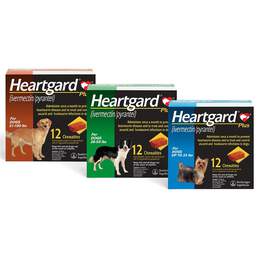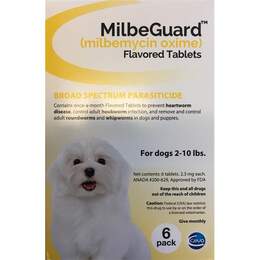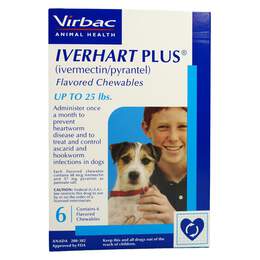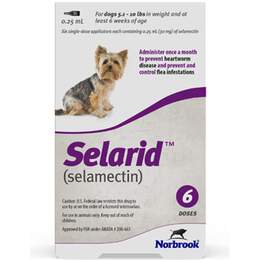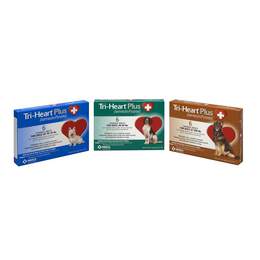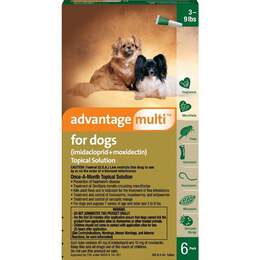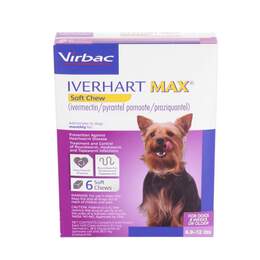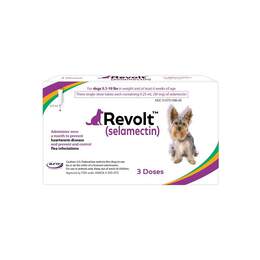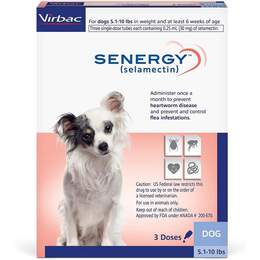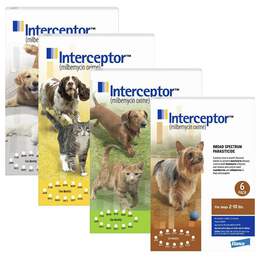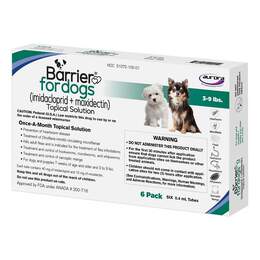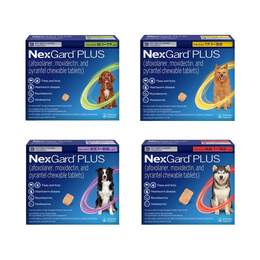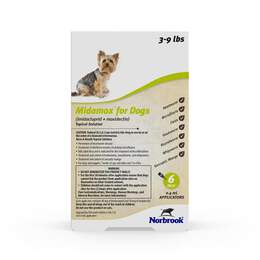Heartworm Medicine for Dogs
WHAT ARE HEARTWORMS?
Heartworm disease is a very serious, potentially life-threatening illness. Heartworms can be transmitted in a number of ways, especially through mosquito bites. Mosquitoes carry heartworms from infected animals to your pet, spreading baby worms that will mature into an infective larvae stage within 10 to 14 days. Infective larvae enter new hosts through the open wound of a mosquito bite, growing over the course of 6 months into adults. They can live for as long as 5 to 7 years inside dogs.
Heartworms are a foot long, and they take up residence in your pet’s blood vessels, lungs, and heart. They can cause heart failure, severe lung disease, and organ damage. Once heartworms find their way into your dog’s body, they reproduce. Dogs have been known to harbor hundreds of worms at one time. While heartworms can sometimes be eradicated, the damage they leave behind lasts forever. The damage will permanently affect your dog’s quality of life. Heartworm in dogs can prove fatal. To avoid this, use heartworm prevention for dogs, such as Heartgard Plus, Simparica Trio, or one of the other heartworm medications listed below.
When your pet is newly infected with heartworms, they may not show any symptoms. As the infection progresses, the symptoms of heartworm in dogs will likely appear or worsen. The most common symptoms of heartworm disease are mild, persistent coughing, decreased appetite, fatigue after moderate activity, reluctance to exercise, vomiting, and weight loss. Your pet could show other symptoms as well. Heartworms are incredibly difficult to treat, so the best course of action is prevention with heartworm medication. Heartworm medicine for dogs is an important but easy way to keep your beloved pet safe.
Clinical Signs of Heartworm Disease in Dogs
In its early stages, heartworm disease is almost undetectable without a blood test. There are few symptoms to let you know what is going on inside your dog. As the infection progresses, obvious symptoms develop. Here are some symptoms that may indicate heartworms in dogs.
A Soft, Dry Cough
Coughing is often the first sign a dog has a heartworm infection. As the heartworms enter the lungs, they multiply, filling the lungs and the veins surrounding them. When this happens, dogs will often cough after exercise, and they may also faint, even after minimal exercise.
Difficulty or Rapid Breathing
In addition to a cough, dogs with heartworm infection may find it hard to breathe when the worms have infested the lungs and veins surrounding them. Fluid may build up around the blood vessels that serve the lungs and make it hard for them to oxygenate the blood.
Anorexia or Weight Loss
As the heartworm infection advances, even minor physical activity can be difficult, including eating. Because of this, you may notice your dog has little or no appetite. This can lead to weight loss.
A Bulging Chest
You may see protruding ribs on your dog and a bulging chest due to a heartworm infection. This symptom can be due to anorexia and weight loss often caused by heartworms or by the fluid build-up caused by the parasite.
Fatigue or Inactivity
If your dog was generally active and full of energy but now seems more tired than normal, shows no desire to go outside, and avoids physical activity, they may have a heartworm infection. Dogs suffering from heartworm infection often find being active difficult, even the most minor activities.
Possible Allergic Reaction
Although allergic reactions from heartworm happen more often in cats, it is still a possibility in dogs, so knowing the symptoms is essential.
- Red, moist, itchy skin
- Scabby skin
- Intense scratching
- Runny, itchy eyes
- Ear infections or itchy ears
- Sneezing
- Diarrhea and vomiting
Collapse
If enough heartworms infect your dog’s heart, they can block the blood flow, and your dog may collapse. This is known as caval syndrome, a severe form of heartworm disease and is often accompanied by shock and the destruction of red blood cells, and usually leads to death.
Collapse is often accompanied by shock and red blood cell destruction, with death occurring in the following days.
Other Symptoms of Heartworm Disease in Dogs
The symptom above are the most common ones seen in dogs suffering from heartworm. However, there are other, less common symptoms that your dog may have, including:
- Nosebleeds
- Excessive sleeping
- Secondary pneumonia
- Increased blood pressure
- Seizures
- Blindness
- Difficulty moving or lameness
Seizures, blindness, and lameness happen when the heartworm parasites get lost and migrate to other parts of the body. Rarely, they even migrate to the eyes or the brain.
These symptoms may also indicate other conditions, making it difficult to determine if your dog has a heartworm infection. If you think your dog is suffering from heartworm, visit your vet immediately. They will test for heartworm and develop the proper treatment protocol for your dog.
How Often Do Dogs Get Heartworms?
Approximately 300,000 dogs in the U.S. get heartworm each year. The number of heartworm infections in dogs depends on where you live, with the majority of cases in the southeast. But that doesn’t mean your dog is not at risk.
There are many things to consider, even if heartworms are not a big problem where you live. You may not be aware of the prevalence of heartworm in your area, or you may, without realizing it, travel with your dog to an area where heartworm incidence is more common.
Heartworm is being found in new areas of the country every year. Neglected and stray dogs and some wildlife species such as wolves, coyotes, and foxes can carry heartworms. In addition, the wind can, and often does, blow mosquitoes great distances, contributing to more instances of heartworm disease.
In fact, heartworm diagnoses have been made in all 50 states. Risk factors are difficult, if not impossible, to predict. Variables include climate change to wildlife carriers can cause infection rates to swing dramatically year over year.
Although outdoor pets are more likely to become infected with heartworms, since infected mosquitoes can easily come inside, indoor pets are also at risk. For this reason, it is recommended that you get your dog tested for heartworm every 12 months and that you regularly give them heartworm medicine for dogs.
Preventing Heartworm Disease in Dogs
You may wonder, why do you need a prescription for heartworm medicine? The answer is simple. Heartworm medicine treatment should only be initiated when your dog has tested negative for heartworms. If they are already infected, they should be treated for existing heartworms before they begin preventative medication. While it might be frustrating that you cannot obtain heartworm medicine without a vet, it is important to the health of your dog. Over-the-counter heartworm medicine would not be safe for your dog. Luckily, heartworm tests are easy, fast, and affordable. Once your dog tests negative for heartworm disease, you can have a discussion with your veterinarian about the best heartworm medicine options for your pet.
Heartworm pills are a popular, easily administered way to protect your dog from heartworms. Heartworm prevention for dogs should be discussed with your veterinarian so you can decide on the best choice for your dog’s individual needs.
Heartworm prevention is an important concern for every pet owner. Prevention is an integral part of providing essential care, and heartworm disease prevention for dogs is something every owner can do.
Dogs need heartworm prevention year-round, not just in the warm-weather months. Heartworm prevention for dogs works by treating any heartworms that may have infected your dog within the last month or so. These preventatives need to be administered on time, every month, for peak efficiency. That’s why year-round heartworm prevention is ideal.
Although there are strategies owners can use to reduce a dog’s exposure to mosquitoes, there are no natural heartworm preventives. Heartworm medicine is safe, economical, and easy to administer, but heartworm treatment can be hard on your dog and your wallet if your dog gets infected. It generally requires many veterinarian visits and many months of no exercise for your dog.
It is easy to prevent heartworm with a monthly chewable heartworm medication for dogs, spot-on topical medication, or an injection that lasts six months (administered by your vet). Some pet owners may be worried about the safety of heartworm meds for dogs, but veterinarians have confidence in them and can vouch for their safety.
Heartworm medication, like many other veterinary medications, is intensively tested for safety and efficacy. Side effects are rare but possible. Any concerns you have about heartworm medication for dogs and adverse reactions of side effects should be discussed with your veterinarian.
Some herding breeds and sighthounds have a known genetic sensitivity to the heartworm preventative ivermectin. However, not every dog in these breeds will have the gene that triggers sensitivity. When choosing heartworm meds for dogs, or any medication for your pet, talk with your veterinarian about safety and the appropriate option for your pet’s needs.
WHAT IS THE BEST HEARTWORM MEDICINE FOR DOGS?
Allivet offers all of the top vet-recommended options for heartworm medicine for dogs:
- Heartgard: This chewable heartworm treatment for dogs prevents heartworm, along with roundworms and hookworms.
- Trifexis: This flea and heartworm medicine for dogs kills fleas, prevents heartworm disease, and controls infections of adult roundworm, whipworm, and hookworm.
- Simparica: This monthly chewable heartworm medication for dogs also kills fleas as well as treating and controlling infections of adult roundworm, hookworm, and whipworm.
- Sentinel: This flea and heartworm pill comes in tablet form and prevents heartworms, controls and prevents flea infestations, controls adult hookworms, and removes and controls adult whipworm and roundworm.
- Tri-Heart: This chewable heartworm medication for dogs prevents heartworms. It also controls and treats ascarids and hookworms.
- Interceptor: One of the best affordable heartworm prevention options, this chewable heartworm medicine prevents heartworms, tapeworm, whipworm, hookworm, and roundworm.
- Revolution: This topical liquid heartworm medicine for dogs offers total protection from parasites, including fleas, heartworms, ear mites, American dog ticks, and sarcoptic mange.
- Iverhart: These chewables are a great choice for effective yet cheap heartworm medicine for dogs. They eliminate the tissue stage of heartworm larvae. They also control and treat your dog for hookworms and ascarids.
Allivet has all the best options for protecting your pet from harmful heartworm disease!



